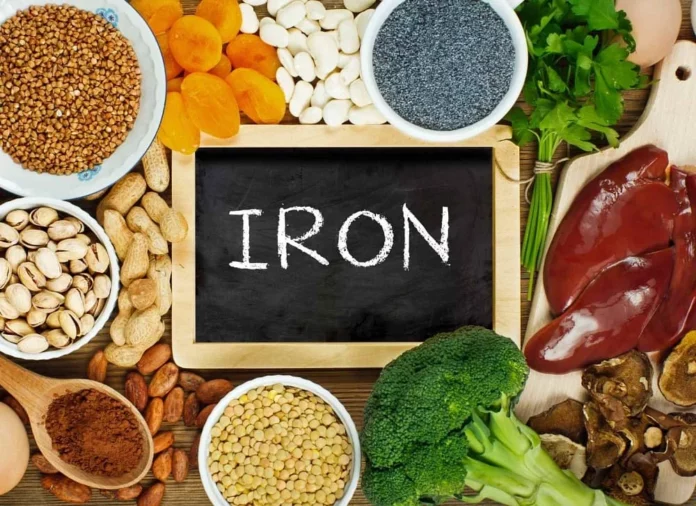Introduction:
Iron is a vital mineral that plays a crucial role in maintaining our overall health and well-being. From oxygen transport to energy production, iron is involved in various essential processes within the body. In this comprehensive guide, we’ll explore the importance of iron, understand its role in the body, and discover a wide range of foods that are naturally high in iron, suitable for both vegetarians and non-vegetarians alike.
Understanding Iron and its Role in the Body:
Iron is a mineral found in both plant-based and animal-based foods. It exists in two forms: heme iron, which is derived from animal sources, and non-heme iron, found in plant-based sources. Heme iron is more easily absorbed by the body compared to non-heme iron. Iron serves several crucial functions in the body, including oxygen transportation, supporting immune function, and aiding in energy metabolism.
Recommended Daily Intake of Iron:
The recommended daily intake of iron varies depending on age, gender, and life stage. Infants, children, adolescents, and pregnant women have higher iron requirements. Factors such as age, sex, and individual health conditions can influence the absorption of iron from dietary sources.
Plant-Based Foods High in Iron:
Spinach and other leafy greens:
Rich in non-heme iron and other essential nutrients
Spinach, kale, and Swiss chard are excellent choices
Legumes and beans:
High in non-heme iron and fiber
Examples include lentils, chickpeas, and black beans
Nuts and seeds:
Great sources of iron, healthy fats, and other nutrients
Pumpkin seeds, cashews, and almonds are iron-rich options
Whole grains:
Iron-fortified cereals, quinoa, and oats
Provide a good amount of non-heme iron and dietary fiber
Fortified cereals and bread:
Widely available and enriched with iron and other essential nutrients
Check labels for iron content and choose whole-grain options
Animal-Based Foods High in Iron:
Red meat:
Contains heme iron, which is highly bioavailable
Lean cuts of beef, lamb, and venison are iron-rich choices
Poultry and seafood:
Chicken, turkey, and fish like salmon and sardines are good sources
Combination of heme and non-heme iron in seafood
Organ meats:
Liver, specifically beef liver, is exceptionally high in iron
Kidneys and heart also contain substantial amounts of iron
Eggs:
Considered a moderate source of iron, particularly the yolks
Additionally, eggs provide other essential nutrients
Dairy products:
While not a significant source of iron, dairy products can contribute to overall iron intake
Choose fortified dairy alternatives if lactose intolerant or following a vegan diet
Enhancing Iron Absorption:
To optimize iron absorption from both plant-based and animal-based sources, consider the following:
Pairing iron-rich foods with vitamin C sources:
Citrus fruits, tomatoes, and bell peppers can enhance iron absorption
Include a vitamin C-rich food alongside iron-rich meals
Avoiding foods that inhibit iron absorption:
Some foods, like coffee, tea, and calcium-rich products, can hinder iron absorption
Consume these foods separately from iron-rich meals
Cooking techniques to increase iron bioavailability:
Soaking and sprouting legumes and grains can enhance iron absorption
Cooking in cast-iron cookware can increase iron content
Iron Supplements:
In some cases, iron supplements may be necessary to meet daily iron requirements. It’s essential to consult a healthcare professional before considering iron supplementation to determine the appropriate dosage and duration.
When to consider iron supplements:
Iron deficiency anemia or chronic health conditions may require supplementation
Blood tests can help determine iron levels and guide supplementation decisions
Types of iron supplements:
Ferrous sulfate, ferrous fumarate, and ferrous gluconate are common forms
Slow-release and liquid supplements are also available
Potential side effects and considerations:
Common side effects include constipation, nausea, and stomach discomfort
Iron supplements may interact with certain medications, so consult a healthcare professional
Iron Absorption and Lifestyle Factors:
Several lifestyle factors can influence iron absorption and metabolism within the body:
Effects of caffeine and tea on iron absorption:
Consuming coffee or tea with iron-rich meals can reduce iron absorption
Separate consumption by at least an hour or enjoy them between meals
Impact of alcohol consumption on iron levels:
Excessive alcohol intake can lead to iron deficiency and impair absorption
Drink alcohol in moderation and consider regular iron-rich meals
Role of physical activity in iron metabolism:
Endurance athletes and individuals engaging in intense exercise may have higher iron requirements
Regular physical activity can enhance iron absorption and utilization
Iron-Rich Diet for Vegetarians and Vegans:
Maintaining adequate iron levels can be a particular challenge for vegetarians and vegans due to the absence of heme iron. However, with careful planning and knowledge of plant-based iron sources, it is possible to meet the required intake:
Challenges for vegetarians and vegans:
Non-heme iron requires additional considerations for optimal absorption
Combining iron-rich plant foods with vitamin C sources enhances absorption
Plant-based iron sources for vegetarians and vegans:
Dark leafy greens, legumesand beans, nuts and seeds, and whole grains offer substantial iron content
Incorporate iron-rich plant foods into daily meals and snacks
Combining plant-based foods for optimal iron intake:
Pair iron-rich foods with vitamin C sources for better absorption
For example, combining spinach with citrus fruits or lentils with bell peppers
Conclusion:
Maintaining adequate iron levels is essential for overall health and well-being. By incorporating a variety of iron-rich foods into your diet, both from plant-based and animal-based sources, you can meet your daily iron requirements. Remember to pay attention to factors that enhance or inhibit iron absorption, such as combining iron-rich foods with vitamin C sources and avoiding substances like coffee and tea that hinder absorption. If needed, consult a healthcare professional to determine if iron supplementation is necessary. Whether you follow a vegetarian, vegan, or omnivorous diet, there are plenty of options available to ensure you’re getting the iron your body needs to thrive.


